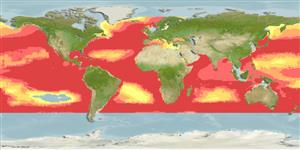Classificação / Names
Common names from other countries
Referência principal
Tamanho / Peso / Idade
Max length : 200 cm TL macho/indeterminado; (Ref. 5188); common length : 120 cm TL macho/indeterminado; (Ref. 5217); Peso máx. publicado: 270.0 kg (Ref. 5188)
Ambiente
; marinhas batipelágico; oceanódromo (Ref. 51243); intervalo de profundidade 0 - 500 m (Ref. 89422), usually ? - 366 m (Ref. 5951)
Clima / Intervalo
Deep-water, preferred 23°C (Ref. 107945); 75°N - 60°S, 180°W - 180°E
Distribuição
Worldwide in tropical to temperate waters (Ref. 57923). Western Atlantic: Grand Banks and Nova Scotia (Canada) to Florida (USA), Gulf of Mexico and the West Indies (Ref. 7251) up to Argentina (Ref. 47377). Eastern Atlantic: Norway and Greenland to Senegal (Ref. 6737) and south of Angola (Ref. 6476) also Mediterranean. Eastern Pacific: Gulf of Alaska to south of southern California (Ref. 265). A single capture in South Georgia marks an incidental occurrence in Southern Ocean.
Países | Áreas FAO | Ecossistemas | Ocorrências | Introduções
Descrição breve
Espinhos dorsais (total): 0; Raios dorsais moles (total): 48-55; Espinhos anais 0; Raios anais moles: 33 - 41; Vértebras: 43. Caudal fin broadly lunate; pectorals long and falcate; pelvic fins similar to pectoral fins in shape and a little longer (Ref. 6885). Dark steely blue dorsally shading into green with silver and purple iridescence, belly rosy, body covered with silvery spots in irregular rows, light mottling on caudal and dorsal fins; vermillion on fins and jaws, golden around eyes (Ref. 6885).
Categoria na Lista Vermelha da IUCN (Ref. 115185)
Ameaça para o homem
Harmless
Utilização humana
Pescarias: pouco comercial; peixe desportivo: sim
Mais informação
ReferênciasAquaculturaPerfil para aquaculturaEstirpesGenéticaFrequência dos alelosHereditariedadeDoençasProcessamentoMass conversion
Ferramentas
Relatórios especiais
Descarregue XML
Fontes da internet
Estimates of some properties based on models
Phylogenetic diversity index
PD50 = 1.0000 many relatives (e.g. carps) 0.5 - 2.0 few relatives (e.g. lungfishes)
Nível Trófico
4.2 ±0.62 se; Based on food items.
Resiliência
Baixo, tempo mínimo de duplicação da população 4,5 - 14 anos (Assuming tm>4)
Vulnerabilidade
High vulnerability (60 of 100)
Categoria de preço
